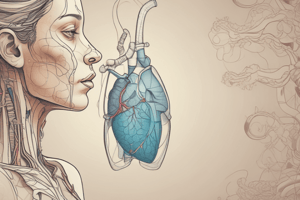Podcast
Questions and Answers
What is the primary function of the nasal cavity in the respiratory system?
What is the primary function of the nasal cavity in the respiratory system?
- To transport oxygen to the body's cells
- To produce mucus and ciliated epithelia
- To absorb oxygen from the air
- To remove particulate matter and warm and humidify the air (correct)
What is the process by which oxygen enters the bloodstream and carbon dioxide is removed from the bloodstream?
What is the process by which oxygen enters the bloodstream and carbon dioxide is removed from the bloodstream?
- Oxygenation
- Cellular metabolism
- Respiration
- Gas exchange (correct)
What is the primary site of gas exchange in the respiratory system?
What is the primary site of gas exchange in the respiratory system?
- Nasal cavity
- Alveoli (correct)
- Bronchi
- Trachea
What is the function of goblet cells and ciliated epithelia in the respiratory system?
What is the function of goblet cells and ciliated epithelia in the respiratory system?
What is the molecule that binds to oxygen in the bloodstream and transports it to the body's cells?
What is the molecule that binds to oxygen in the bloodstream and transports it to the body's cells?
What is the waste product of cellular metabolism that is removed from the bloodstream during gas exchange?
What is the waste product of cellular metabolism that is removed from the bloodstream during gas exchange?
What is the term for the process of exchanging oxygen and carbon dioxide between the environment and the body's cells?
What is the term for the process of exchanging oxygen and carbon dioxide between the environment and the body's cells?
What is the primary consequence of failure in gas exchange in the respiratory system?
What is the primary consequence of failure in gas exchange in the respiratory system?
What is the fundamental function of the respiratory system that plays a critical role in maintaining the health and well-being of all aerobic organisms?
What is the fundamental function of the respiratory system that plays a critical role in maintaining the health and well-being of all aerobic organisms?
What is the primary function of the nasal cavity in the process of gas exchange?
What is the primary function of the nasal cavity in the process of gas exchange?
Which of the following is NOT a common principle of treating respiratory diseases?
Which of the following is NOT a common principle of treating respiratory diseases?
What is the outcome of inadequate gas exchange in the respiratory system?
What is the outcome of inadequate gas exchange in the respiratory system?
What is the site of gas exchange in the respiratory system?
What is the site of gas exchange in the respiratory system?
Why is understanding the mechanisms of gas exchange crucial for individuals?
Why is understanding the mechanisms of gas exchange crucial for individuals?
What is the consequence of ineffective removal of carbon dioxide in the respiratory system?
What is the consequence of ineffective removal of carbon dioxide in the respiratory system?
What is the primary indicator of respiratory acidosis in an arterial blood gas test?
What is the primary indicator of respiratory acidosis in an arterial blood gas test?
What is the primary cause of an increase in hydrogen ions and a decrease in blood pH in respiratory acidosis?
What is the primary cause of an increase in hydrogen ions and a decrease in blood pH in respiratory acidosis?
How is respiratory acidosis further classified?
How is respiratory acidosis further classified?
Which of the following conditions is likely to cause chronic respiratory acidosis?
Which of the following conditions is likely to cause chronic respiratory acidosis?
What is the most critical aspect of treating respiratory acidosis?
What is the most critical aspect of treating respiratory acidosis?
What is the primary consequence of untreated respiratory acidosis?
What is the primary consequence of untreated respiratory acidosis?
What is a potential consequence of severe respiratory acidosis?
What is a potential consequence of severe respiratory acidosis?
What is a common symptom of respiratory acidosis?
What is a common symptom of respiratory acidosis?
What is the role of serum bicarbonate levels in diagnosing respiratory acidosis?
What is the role of serum bicarbonate levels in diagnosing respiratory acidosis?
What is the primary goal of supportive care in treating respiratory acidosis?
What is the primary goal of supportive care in treating respiratory acidosis?
What is a potential complication of chronic respiratory acidosis?
What is a potential complication of chronic respiratory acidosis?
What is a common finding in patients with chronic respiratory acidosis?
What is a common finding in patients with chronic respiratory acidosis?
What is the relationship between respiratory acidosis and the partial pressure of carbon dioxide?
What is the relationship between respiratory acidosis and the partial pressure of carbon dioxide?
What is the significance of maintaining a pH range of 7.35 to 7.45 in the blood?
What is the significance of maintaining a pH range of 7.35 to 7.45 in the blood?
What is the primary function of the lungs in maintaining acid-base balance?
What is the primary function of the lungs in maintaining acid-base balance?
What is the role of the kidneys in maintaining acid-base balance?
What is the role of the kidneys in maintaining acid-base balance?
What is the significance of the pH scale in measuring the acidity or alkalinity of a solution?
What is the significance of the pH scale in measuring the acidity or alkalinity of a solution?
What is the consequence of a minor deviation from the normal pH range in the body?
What is the consequence of a minor deviation from the normal pH range in the body?
What is the relationship between the brain and lungs in regulating blood pH?
What is the relationship between the brain and lungs in regulating blood pH?
What is the significance of the normal pH range of 7.35 to 7.45 in the body's fluids?
What is the significance of the normal pH range of 7.35 to 7.45 in the body's fluids?
What is the primary function of the buffer systems in the human body?
What is the primary function of the buffer systems in the human body?
What is the result of having too much acid or too little base in the blood?
What is the result of having too much acid or too little base in the blood?
What is the common cause of respiratory acidosis?
What is the common cause of respiratory acidosis?
What is the result of having too much base or too little acid in the blood?
What is the result of having too much base or too little acid in the blood?
What is the primary mechanism by which the body regulates blood pH?
What is the primary mechanism by which the body regulates blood pH?
What is the consequence of severe acidosis or alkalosis?
What is the consequence of severe acidosis or alkalosis?
What is the role of the kidneys in regulating acid-base balance?
What is the role of the kidneys in regulating acid-base balance?
What is the relationship between CO2 levels and acid-base balance?
What is the relationship between CO2 levels and acid-base balance?
Flashcards are hidden until you start studying
Study Notes
Introduction
The respiratory system plays a crucial role in maintaining life by facilitating the exchange of gases between the environment and the body's cells. Oxygen (O2) is taken in from the environment, while carbon dioxide (CO2) is released as a waste product. This process is known as gas exchange, which is essential for the survival of all aerobic organisms. In this article, we will explore the concept of gas exchange in the respiratory system and its importance in maintaining the health and well-being of animals.
Gas Exchange in the Respiratory System
Gas exchange in the respiratory system occurs through the lungs. Air is inhaled through the nasal cavity, which warms and humidifies the air, while removing particulate matter. The air then passes through the trachea and bronchi, which are lined with mucus-producing goblet cells and ciliated epithelia, helping to protect the system from foreign particles. The air eventually reaches the alveoli, which are tiny air sacs where gas exchange occurs between the air and the bloodstream.
Oxygen from the inhaled air diffuses through the alveolar walls into the bloodstream, where it binds to hemoglobin and is transported to the body's cells. At the same time, carbon dioxide, a waste product of cellular metabolism, diffuses from the blood into the alveoli, where it is exhaled. This process ensures that the body's cells receive a constant supply of oxygen and eliminates the excess CO2.
Importance of Gas Exchange in Health and Disease
The proper functioning of the respiratory system is essential for maintaining the health and well-being of animals. Failure of gas exchange can lead to hypoxia (lack of oxygen) and hypercapnia (elevated CO2 levels), which can cause severe health issues and even death. Common principles of treating respiratory diseases include ensuring adequate oxygenation of blood and excretion of carbon dioxide, relieving pulmonary inflammation, effectively treating infectious causes, relieving bronchoconstriction, and providing supportive care.
Conclusion
In conclusion, gas exchange is a fundamental function of the respiratory system, which plays a critical role in maintaining the health and well-being of all aerobic organisms. The process of inhalation, warming, humidification, and removal of particles in the nasal cavity, and the exchange of gases in the alveoli, are essential for the proper functioning of the respiratory system. Any disruption or failure in gas exchange can lead to severe health issues and even death. Understanding the mechanisms of gas exchange and the importance of the respiratory system is crucial for both medical professionals and individuals seeking to maintain their overall health and well-being.
Studying That Suits You
Use AI to generate personalized quizzes and flashcards to suit your learning preferences.




